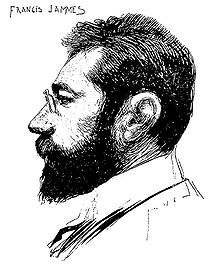Francis Jammes
Francis Jammes | |
|---|---|
 Jammes in 1917 | |
| Born | December 2, 1868 Tournay, Hautes-Pyrénées, France |
| Died | November 1, 1938 (aged 69) Hasparren, Pyrénées-Atlantiques, France |
| Occupation | Poet |
Francis Jammes (French pronunciation:
Biography
Jammes was a mediocre student and failed his baccalauréat with a zero for French. His first poems began to be read in Parisian literary circles around 1895, and were appreciated for a fresh tone breaking away from symbolism.[citation needed]
In 1896 Jammes travelled to
In the eyes of Parisian literary circles, Francis Jammes was generally considered a solitary provincial who chose to live a life of retreat in his mountainous
Jammes was the original author of Georges Brassens's song La Prière ("The Prayer"). The lyrics were taken from the poem Les Mystères douloureux ("The Agonies of Christ") published in the collection L'Église habillée de feuilles ("The Church Clothed in Leaves") (1906); Brassens changed some of the words to make the text more rhythmic.[citation needed]
Jammes was known to have an ardent passion for field sports, especially game hunting. He was known to have also been a believer in the conservation of endangered species.[citation needed]
Thirteen poems from his cycle Tristesses ("Sorrows"), were set to music by composer Lili Boulanger in 1914 under the title Clairières dans le ciel ("Clearings in the Sky") a title Jammes had given to an assorted collection of poetry of which Tristesses was a part. The whole cycle was composed for soprano, flute and piano by Michel Bosc.[citation needed]
Works

Poetry
Each year links to its corresponding "[year] in poetry" article:
- 1891: Six Sonnets[a]
- 1892: Vers,[a] also 1893 and 1894[1]
- 1895: Un jour[a]
- 1897: La Naissance du poète ("The Birth of the Poet")[a]
- 1898: Quatorze prières[a]
- 1898:
 Works related to De l’Angélus de l’aube à l’Angélus du soir at Wikisource ("From the Morning Prayer to the Evening Prayer")[a]
Works related to De l’Angélus de l’aube à l’Angélus du soir at Wikisource ("From the Morning Prayer to the Evening Prayer")[a] - 1899: Le Poète et l'oiseau ("The Poet and the Bird")[a]
- 1899: La Jeune Fille nue[a]
- 1900–1901: Le Triomphe de la vie[a]
- 1901: Le Deuil des primevères[1]
- 1902–1906: Clairières dans le ciel[a]
- 1905: Tristesses[1]
- 1906: Clairières dans le Ciel[1]
- 1906: L'Eglise habillée de feuilles[a]
- 1906: Le Triomphe de la vie
- 1908: Poèmes mesurés[a]
- 1908: Rayons de miel, Paris: Bibliothèque de l'Occident[a]
- 1911–1912: Les Géorgiques chrétiennes ("Christian Georgics"), three volumes[a]
- 1913: Feuilles dans le vent[a]
- 1916: Cinq prières pour le temps de la guerre, Paris: Librairie de l'Art catholique[a]
- 1919: La Vierge et les sonnets, Paris: Mercure de France[a]
- 1921: Épitaphes, Paris: Librairie de l'Art catholic[a]
- 1921: Le Tombeau de Jean de la Fontaine, Paris: Mercure de France[a]
- 1922, 1923, 1924, 1925, Livres des quatrains[1]
- 1923: La Brebis égarée[a]
- 1923–1925 Les Quatrains, in four volumes[a]
- 1925: Brindilles pour rallumer la foi, Paris: Éditions Spes[a]
- 1926: Ma France poétique, Paris: Mercure de France[a]
- 1928: Diane[a]
- Bloud et Gay[a]
- 1935: Alouette[1]
- 1935: De tout temps à jamais, Paris: Gallimard[a]
- 1936: Sources, Paris: Le Divan[a]
- 1943: Elégies et poésies diverses[a]
- 1946: La Grâce[a]
Prose
Each year links to its corresponding "[year] in literature" article:
- 1899: Clara d'Ellébeuse; ou, L'Histoire d'une ancienne jeune fille[a]
- 1901: Almaïde d'Etremont; ou, L'Histoire d'une jeune fille passionée[a]
- 1903: Le Roman du lièvre[a]
- 1904: Pomme d'Anis; ou, L'Histoire d'une jeune fille infirme[a]
- 1906: Pensée des jardins[a]
- 1910: Ma fille Bernadette[a]
- 1916: Le Rosaire au soleil, Paris: Mercure de France[a]
- 1918: Monsieur le Curé d'Ozeron[a]
- 1919: Une vierge, Paris: Édouard-Joseph[a]
- 1919: Le Noël de mes enfants, Paris: Édouard-Joseph[a]
- 1919: La Rose à Marie, Paris: Édouard-Joseph[a]
- 1920: Le Poète rustique, Paris: Mercure de France[a][a]
- 1921: Le Bon Dieu chez les enfants[a]
- 1921: De l'âge divin à l'âge ingrat, the first of three volumes of his memoirs, followed by L'Amour, les muses et la chasse, 1922; Les Caprices du poète, 1923[a]
- 1921: Le Livre de saint Joseph, Paris: Plon-Nourrit[a]
- 1922: Le Poète et l'inspiration, Nîmes, France: Gomès[a]
- 1923: Cloches pour deux mariages, Paris: Mercure de France[a][a]
- 1925: Les Robinsons basques[a]
- 1926: Trente-six femmes, Paris: Mercure de France[a]
- 1926: Basses-Pyrénées, Paris: Émile-Paul[a]
- 1927: Lavigerie[a][a]
- 1928: Janot-poète[a]
- 1928: Les Nuits qui me chantent[a]
- 1928: La Divine Douleur[a]
- 1930: Champétreries et méditations[a]
- 1930: Leçons poétiques, Paris: Mercure de France[a]
- 1932: L'Antigyde; ou, Elie de Nacre[a]
- 1934: Le Crucifix du poète, Paris: M. deHartoy[a]
- 1936: Le Pèlerin de Lourdes, Paris: Gallimard[a]
- 1938: La Légende de l'aile; ou, Marie-Elisabeth[a]
- 1941: Saint Louis; ou, L'Esprit de la Croisade, Paris: F. Sorlot[a]
See also
Notes
- "POET Francis Jammes (1868 - 1938)". The Poetry Foundation. Retrieved 30 August 2009.
References
- ^ ISBN 978-0-14-042385-3.
Further reading
- Lowe, Amy (1915). Francis Jammes. New York: The Macmillan Company. pp. 211–268.
{{cite book}}:|work=ignored (help)
External links
- Works by Francis Jammes at Project Gutenberg
- Works by or about Francis Jammes at Internet Archive
- Works by Francis Jammes at LibriVox (public domain audiobooks)

- Poems by Francis Jammes
- Official site (in French)
- Francis Jammes au Club des Poètes (in French)
- Selection of poems (in French)
- Francis Jammes at Find a Grave
- Francis Jammes Index des titres ou incipits
